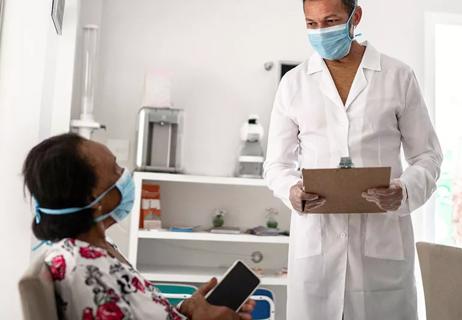Follow these steps to improve your outcome

If you are planning for an upcoming scheduled surgery, you might not realize that there are things you can do in the days or weeks before to increase your chances of a successful outcome.
Advertisement
Cleveland Clinic is a non-profit academic medical center. Advertising on our site helps support our mission. We do not endorse non-Cleveland Clinic products or services. Policy
Don’t simply wait for the scheduled date. Take these actions to be as healthy and strong as you can be, says general surgeon Diya Alaedeen, MD. He offers these tips to help prepare.
In the days before your surgery, eat foods that are rich in vitamins and minerals. “I use the term, ‘cleaner diet,’ focused heavily on fruits and vegetables,” Dr. Alaedeen says. “We know that overall inflammation goes down when you eat foods from these food groups.”
Also, avoid processed foods, red meat and other foods which are more difficult to break down. ”As your body prepares for a shock that’s coming up, avoiding those things will decrease inflammatory markers,” he says.
Among other benefits, getting more exercise in the weeks before a surgery will increase your chances of walking sooner after the surgery.
“Even if you’re not an athlete, patients can train their bodies during the weeks leading up to surgery,” says Dr. Alaedeen. Even something as simple as parking farther away from the door where you work or shop can help.
“Shoot for 5,000 to 10,000 steps a day to increase your stamina. The main thing is that, undoubtedly, one of the discharge criteria you’re going to have to meet before you go home is getting close to your preoperative level of activity,” he says.
Advertisement
Use the time before surgery to quit smoking, stop drinking or using “any mood-altering substances that can affect your sleep or anxiety levels leading up to surgery,” Dr. Alaedeen says.
“Certainly in the few days leading up to surgery, alcohol and smoking can really affect the anesthesia.”
On the positive side, patients absolutely should engage in “meditation, prayer and things that are important to help them through the trauma that they’re about to undergo,” Dr. Alaedeen says.
If you have two weeks or more before surgery, it’s especially important to check in and let your doctor know what’s coming up.
“Your primary care physician might want to make changes in your medications to optimize surgery,” Dr. Alaedeen says. “Your blood pressure and blood sugar need to be well-controlled. From a wound-healing standpoint, the better the sugars are controlled, especially for diabetics, the better recovery you’re going to have.”
Be sure to ask your doctor about vitamins and supplements, because some of them can interact with other medications, particularly anticoagulants.
Medications that impact bleeding, such as aspirin, anti-inflammatory drugs (like Advil®), Plavix® and Coumadin® probably should be stopped, Dr. Alaedeen says.
“But these questions are addressed in the pre-op medical clearance appointment,” he says. “It really is the provider’s role to counsel patients on medication/supplement usage as this varies from patient-to-patient.”
Advertisement
Learn more about our editorial process.
Advertisement

Before agreeing to surgery, ask about cardiac risk

People who are frail have a higher risk of complications

Severed milk ducts or lost glandular tissue may affect your milk production

Larger polyps can be difficult to remove, but there are options

Smoking before surgery puts you at risk for death and other complications

Most recommended precautions center around minimizing bruising or swelling

Even one drink can have an impact on your cognitive function leading to slurred speech, blurred vision and impaired memory

Type 2 diabetes isn’t inevitable with these dietary changes

Applying a hot or cold compress can help with pain